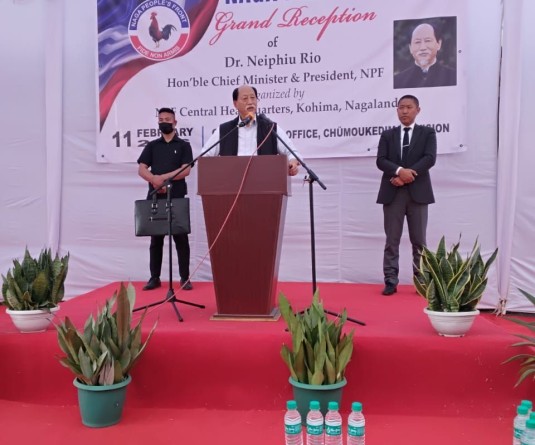
Dimapur, September 29 (MExN): The Nagaland Bar Association (NBA) today raised concerns regarding implementation of the Securitisation and Reconstruction of Financial Assets and Enforcement of Security Interest Act, 2002 (SARFAESI Act) in Nagaland. Among other, it underscored that the Act was an “infringement of the constitutional rights conferred by Article 371A of the Constitution of India, 1950,” and pointed various factors that would impede the growth of the state’s economy.
On Wednesday, NBA President Talitsungba Ao and Secretary V Hukavi Zhimomi issued a press release stating that the association had taken cognisance of recent publications in the local print media where some organisations had pressed the State Government to apply the Act in Nagaland. The matter was taken up during the NBA’s Executive Committee meeting on September 20 and the Bar resolved to issue the press release on the subject in public interest, it said.
Act empowers Banks & Financial institutions
Stating that the enactment of SARFAESI Act was necessitated after multinational companies stepped in and brought fierce economic competition in the country, the NBA said an acute need to assist banks and financial institutions in the recovery of loans arose because there were heavy losses being incurred on account of unpaid debts.
“The SARFAESI Act, therefore, empowers the Banks and Financial Institutions (BFI) to recover dues to them faster without intervention of Courts and Tribunals even without availing to approach Debts Recovery Tribunal by deploying Assets Reconstruction Companies (ARCS) as their legal agent by entering into contract.”
According to the NBA, the SARFAESI Act defines three different entities—the secured creditor or BFIs which include the State Bank of India and non-banking financial institutions having assets worth Rs 200 crore; ARCS or agents of the secured creditors; and the borrower taking financial assistance and money loans from the BFI.
Delving into the intricacies of the Act, the NBA drew attention to provisions which allowed BFIs to acquire and take possession of properties or mortgaged assets of the borrower after serving a 60-day notice requiring the borrower to clear the full liabilities, even on default of a single instalment payment by the borrower, by engaging ARCs.
“If the borrower defaults, the entire rights and interests in financial assets and security interest comprising mortgaged properties including the land, building and business establishment, charge created, hypothecation, pledged of properties, any beneficial interest in properties both movable and immovable, any debts or receivables, any beneficial rights, title or interest on any tangible assets given on hire, financial lease, conditional sale in any previous contract of the borrower, and also similar rights and interest in intangible assets stood acquired by the BFI concerned,” it added.
The NBA also pointed out that it is obligatory on the part of the Chief Metropolitan Magistrate or the District Magistrate, as the case may be, to assist the BPI and ARCs to take possession of the assets and documents of the borrower relating to the secured loan.
Legal victims?
Maintaining that the SARFAESI Act is “is wholly a beneficial legislation for BFI and ARCs at the cost of the prospective borrowers,” the NBA underscored that the two entities were empowered to act “without intervention by courts and tribunals.”
“The BFI need not file application before the Debt Recovery Tribunal, and can straight away execute the terms of the loan transaction through the ARCs against the borrower, the guarantor and indemnifier,” it said. The resultant affect, the NBA contended, would be disastrous to the upcoming economy as “the legal victims would be no other than members of the business community and entrepreneurs rather than the multinational companies or big industrial houses.”
It also emphasized that even a single instance of default in instalment payments of the loan would entail acquisition of the financial assets and security interest which include the land, building and business establishments, other properties and assets which are mortgaged, pledged, hypothecated, charge created, as well as any other security furnished by the borrower and their guarantor as security for repayment of the loan. The same would be applicable even in the case of government employees who pass away leaving outstanding money loans and unredeemed security assets, thereby subjecting legal heirs and successors to ‘extremity’ at the hands of BFIs and ARCS, it asserted.
“The beneficial business of ARCs at the cost of the borrowers of the loan amount who are unable to repay on time would certainly hit not only the members of the business community, entrepreneurs, and servicemen availing money loans, but also shall resultantly retard the state economy,” the NBA stated.
As per the NBA, the BFIs have ample legal forum for recovery of loans such as filing applications before the Debt Recovery Tribunal or filing suits before civil courts, besides the SARFAESI Act.
Infringement of 371A
In this context, the NBA asserted that implementation of the Act, apart from infringement of the constitutional rights conferred by Article 371A, “would be highly disastrous to the members of the business community and entrepreneurs as well as the legal heirs and dependants of deceased servicemen, having unpaid money loan in particular and the state economy in general.” As such, it contended that, “it would be much wiser and also legally and constitutionally consonant on the part of the state legislators not to succumb to the pressure,” for the sake of public interest and the economy of the state.




